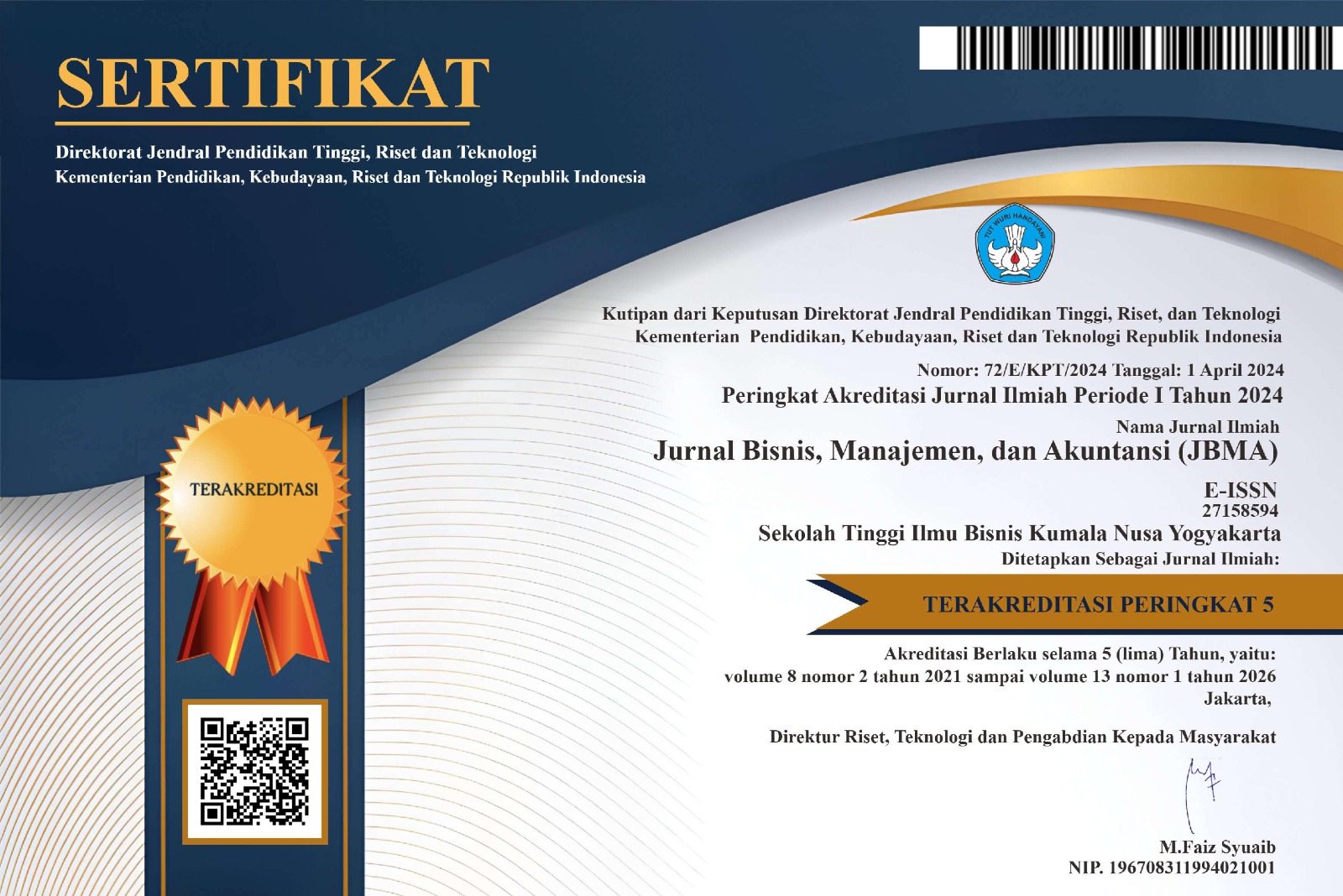Improving the Performance of Islamic Banking through Technological Innovation and Human Resource Management
DOI:
https://doi.org/10.54131/jbma.v11i2.204Keywords:
mudharabah/musyarokah; Syariah Bank; Technology.Abstract
This study base on few islamic banks those aplicate syariah law in runing their business. And the question is what the reason the principal of syaria would be executed? Which human resources those will be prepared to for running syariah bank activities? How the application of technology in assistance of bank syariah performance? The results of study are those; many syaria bank run its system not much different from commercial banks. Just change many terms in arabic language. This happen cause the commercial bank system easier and safer than syariah system. To run the syaria system, so be required better quality resources in running of businesss more than comercial banks. So, it need some analysis experts and business supervisors those more professional, to reduce the level of loses. Beside that, with the assistance of technology can help in coordination and communication with other people, especiallly between shohibul mal. Mudharib and partnership
References
Abubakar, L., & Handayani, T. (2018). Financial Technology: Legal Challenges for Indonesia Financial Sector. In IOP Publishing (Vol. 175, p. 12204). https://doi.org/10.1088/1755-1315/175/1/012204
Ahmad, N., & Zabri, M. Z. M. (2023). The Curious Case of Ribā’s Muted Role in Bank Selection Criteria Among Muslims in Klang Valley, Malaysia. In Emerald Publishing Limited (Vol. 15, Issue 2, pp. 136–158). https://doi.org/10.55188/ijif.v15i2.546
Aisyah, M., & Umiyati, U. (2018). The Mudharabah Savings Demand among the Member of Islamic Financial Service Cooperatives in Bogor. In Sekolah Tinggi Agama Islam Negeri (STAIN) Kudus (Vol. 11, Issue 2, p. 412). https://doi.org/10.21043/iqtishadia.v11i2.3179
Akhmad, K. N. (2023). Dasar-Dasar Penulisan Karya Ilmiah. In Jejak Pustaka (Vol. 1). https://books.google.co.id/books?hl=id&lr=&id=9RSdEAAAQBAJ&oi=fnd&pg
Ali, A., Ullah, R., & Nawaz, T. (2023). IMPACT OF ORGANIZATIONAL TRUST ON ORGANIZATIONAL PERFORMANCE OF ACADEMICIANS: AN EVIDENCE FROM HEIs’ KP, PAKISTAN. Journal of Social Research Development, 4(2), 316–326. https://doi.org/10.53664/jsrd/04-02-2023-08-316-326
Andriani, A., & Putri, O. A. (2022). PERKEMBANGAN TEKNOLOGI FINANSIAL DAN TOTAL PEMBIAYAAN: ANALISIS STRATEGI BANK SYARIAH DI INDONESIA. In State Institute of Islamic Studies (IAIN) Tulungagung (Vol. 3, Issue 01, pp. 1–14). https://doi.org/10.21274/jeps.v3i01.5635
Apriyanti, H. W. (2018). PERKEMBANGAN INDUSTRI PERBANKAN SYARIAH DI INDONESIA : ANALISIS PELUANG DAN TANTANGAN. In Universitas Muhammadiyah Semarang (Vol. 8, Issue 1, p. 16). https://doi.org/10.26714/mki.8.1.2018.16-23
Aziz, A. (2015). Riba In Perspective Fiqh Muamalah and Interest Theory of Conventional Financial Institutions Products. In RELX Group (Netherlands). https://doi.org/10.2139/ssrn.3285683
Bello, S. (2013). The Effect of Ribā in Religion of Islam. In RELX Group (Netherlands). https://doi.org/10.2139/ssrn.2261589
Bouamama, S., & Belalem, G. (2014). Islamic financing for resource management in cloud computing (Vol. 7, Issue 2, p. 158). https://doi.org/10.1504/ijfsm.2014.063957
Efendi, P. S. (2022). Peluang dan Tantangan Fintech Syariah dalam Mendorong Perekonomian UMKM Masyarakat Kediri (Vol. 2, Issue 5, pp. 373–382). https://doi.org/10.59141/comserva.v2i5.319
Endarwati, E. T., Widyastuti, S. M., & Desfitrina, D. (2022). PENGGUNAAN MEDIA SOSIAL SEBAGAI ALTERNATIF STRATEGI PEMASARAN PARA PELAKU USAHA MIKRO KECIL DAN MENENGAH (Vol. 6, Issue 3, pp. 2164–2171). https://doi.org/10.31955/mea.v6i3.2739
Farida, A., Kurniawati, V., & Rahmawati, R. (2022). Implementasi Akad Wadi’ah pada Produk Simpanan Qurban: Study Pemikiran Muhammad Syafii Antonio (Vol. 3, Issue 1, pp. 1–11). https://doi.org/10.33648/jtm.v3i1.219
Fatoni, A. (2020). Perilaku Deposan Perbankan Syarian di Indonesia: Analisis Terhadap Displaced Commercial Risk dan Market Discipline. In Institut Agama Islam Negeri Kendari (Vol. 4, Issue 2, p. 212). https://doi.org/10.31332/lifalah.v4i2.1537
Fermay, A. H., Santosa, B., Kertopati, A. Y., & Eprianto, I. M. (2018). The development of collaborative model between fintech and bank in Indonesia. https://doi.org/10.1145/3234781.3234783
Handayani, T., Aprilia, R., Widaningsih, O., Kesuma, F. N., & Jumansyah, R. (2021). Information Technology on Economic Growth and Stability (Vol. 6, Issue 2, p. 153). https://doi.org/10.33021/firm.v6i2.1560
Harahap, R. A., & Siregar, S. (2022). Investasi Bagi Hasil di Bank Syariah: Perspektif Akuntansi (Vol. 8, Issue 1, p. 750). https://doi.org/10.29040/jiei.v8i1.4678
Hasan, H. (2012). ANALISIS INDUSTRI PERBANKAN SYARIAH DI INDONESIA (Vol. 1, Issue 1, p. 1). https://doi.org/10.14710/jdep.1.1.1-8
Hidayat, A. R., & Trisanty, A. (2020). Analisis Market Share Perbankan Syariah di Indonesia (Vol. 12, Issue 2, pp. 183–200). https://doi.org/10.21580/at.v12i2.6449
Illahi, I. (2019). Fenomena Manajemen Laba Pada Perbankan Syariah di Indonesia dan Tindakan Mitigasinya (Vol. 3, Issue 2, p. 1). https://doi.org/10.30983/es.v3i2.2553
Intia, L. C., & Azizah, S. N. (2021). PENGARUH DEWAN DIREKSI, DEWAN KOMISARIS INDEPENDEN, DAN DEWAN PENGAWAS SYARIAH TERHADAP KINERJA KEUANGAN PERBANKAN SYARIAH DI INDONESIA (Vol. 7, Issue 2). https://doi.org/10.25134/jrka.v7i2.4860
Kurnialis, S., Uliya, Z., Fitriani, F., Aulasiska, M., & Nizam, M. S. (2022). Perkembangan Perbankan Syariah Di Negara Muslim. In UIR Press (Vol. 5, Issue 2, pp. 109–119). https://doi.org/10.25299/syarikat.2022.vol5(2).9688
Kurniawan, A., Rahayu, A., & Wibowo, L. A. (2021). PENGARUH TRANSFORMASI DIGITAL TERHADAP KINERJA BANK PEMBANGUNAN DAERAH DI INDONESIA (Vol. 10, Issue 2, pp. 158–181). https://doi.org/10.34010/jika.v10i2.4426
Manurung, E. S. C. D., & Rudy, D. G. (2019). PERANAN BANK INDONESIA DALAM PELAKSANAAN PEMBERIAN DAN PENCABUTAN IZIN USAHA BANK (Vol. 7, Issue 7, p. 1). https://doi.org/10.24843/km.2019.v07.i07.p06
Mufaidah, M. (2022). The Impact of Financial Inclusion and Islamic Fintech on the Challenges of the SDGs (Sustainable Development Goals). https://doi.org/10.33258/birci.v5i1.4170
Muhammad, H., & Sari, N. P. (2020). Pengaruh Financial Technology Terhadap Perbankan Syariah: Pendekatan ANP-BOCR (The Influence of Financial Technology on Islamic Banking: ANP-BOCR Approach). In Universitas Muhammadiyah Sidoarjo (Vol. 4, Issue 2, pp. 113–125). https://doi.org/10.21070/perisai.v4i2.868
Nadhifah, I. F., & Anwar, A. Z. (2022). Analisis Penerapan PSAK 105 Perhitungan Bagi Hasil Mudharabah pada Bank Syariah Indonesia. In STAIN Ponorogo (Vol. 2, Issue 1, pp. 47–56). https://doi.org/10.21154/etihad.v2i1.3948
Nurhasanah, N., & Imaniyati, N. S. (2019). The Implementation of Sharia Principle in Bank Products as Corporate Identity of Sharia Bank. https://doi.org/10.2991/sores-18.2019.99
Panjaitan, C. (2021). Peranan Tabungan Terhadap Kartu Atm Pada PT. Bank of India Indonesia Tbk (Vol. 2, Issue 1, pp. 42–51). https://doi.org/10.55336/jpb.v2i1.25
Permatasari, S. A. P., & Ratnasari, R. T. (2020). PENGARUH ETIKA KERJA ISLAM TERHADAP LOYALITAS KARYAWAN YAYASAN NURUL HAYAT SURABAYA (Vol. 7, Issue 5, p. 852). https://doi.org/10.20473/vol7iss20205pp852-860
Putra, B. M. (2021). Kebijakan Politik Hukum Negara Terhadap Perbankan Syariah (Vol. 6, Issue 2). https://doi.org/10.20885/jlr.vol6.iss2.art14
Raj, P. E., Wahab, S. A., Zawawi, N. F. M., Awang, K. W., & Ibrahim, W. S. A. A. W. (2020). The benefits of Industry 4.0 on Sustainable Development and Malaysia’s Vision. https://hcvalidate.perfdrive.com/d02cd848bd21&ssb=
Saleh, M., & Lubis, N. (2023). Tinjauan Hukum Islam terhadap Praktik Pembiayaan dengan Akad Murabahah Di Koperasi Citra Mandiri Sejahtera, Pamulang Tangerang Selatan (Vol. 3, Issue 1, pp. 39–47). https://doi.org/10.59270/jab.v3i1.160
Septiana, N. I., & Sanjayawati, H. (2021). Sukuk on Blockchain: Application, Advantages, and Challenges (Vol. 5, Issue 2, pp. 120–133). https://doi.org/10.33379/jihbiz.v5i2.855
Shauma, S., Setyowati, E., & Rosyadi, I. (2022). Analisis Pengaruh CAR, ROA, NPF, dan FDR terhadap Pembiayaan Mudharabah Bank Umum Syariah di Indonesia Tahun 2011-2020 (Vol. 6, Issue 2, p. 484). https://doi.org/10.33087/ekonomis.v6i2.587
Sulistyowati, Rahayu, Y. S., & Naja, C. D. (2023). Penerapan Artificial Intelligence Sebagai Inovasi Di Era Disrupsi Dalam Mengurangi Resiko Lembaga Keuangan Mikro Syariah. In State College of Islamic Studies (STAIN) Kediri (Vol. 7, Issue 2, pp. 117–142). https://doi.org/10.30762/wadiah.v7i2.329
Supriatna, S., Helmi, I., & Nurrohman, N. (2020). MUDHARABAH SCHEME WITHIN THE ISLAMIC BANKING: PROFIT SHARING AND ASSOCIATED PROBLEMS IN IT. In STAIN Ponorogo (Vol. 14, Issue 2, pp. 235–262). https://doi.org/10.21154/kodifikasia.v14i2.2121
Syafii, A. (2001). Bank Syariah: Dari Teori ke Praktik. In Gema Insani Press. https://books.google.co.id/books?id=r3yFiZMvgdAC&printsec=frontcover&sou#v=onepage&q&f=false
Trimulato, T., Nafis, M. C., & Amalia, E. (2022). The Role Sharia Fintech Support Sustanaible Development Goals Program (SDGs) (Vol. 8, Issue 1, p. 251). https://doi.org/10.29040/jiei.v8i1.3911
Usanti, T. P., Shomad, A., & Kurniawan, A. (2014). THE PRINCIPLE OF JUSTICE IN TRANSACTIONS BASED ON PROFIT AND LOSS SHARING IN SHARIA BANKS. In Gadjah Mada University (Vol. 26, Issue 2, p. 308). https://doi.org/10.22146/jmh.16050
Wafa, M. A. (2017). HUKUM PERBANKAN DALAM SISTEM OPERASIONAL BANK KONVENSIONAL DAN BANK SYARIAH (Vol. 16, Issue 2, pp. 257–270). https://doi.org/10.15408/kordinat.v16i2.6441
Downloads
Published
Issue
Section
License
Copyright (c) 2024 Singgih Muheramtohadi, Zuhdan Ady Fataron

This work is licensed under a Creative Commons Attribution-NonCommercial-NoDerivatives 4.0 International License.



















